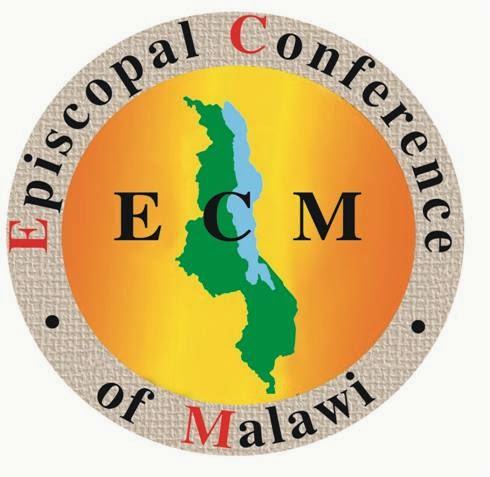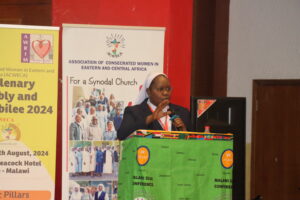VATICAN: The Apostolate of the Family will bring Inestimable Benefits to the Church and Society as a whole; Pope Francis tells the Catholic Bishops of Malawi

The Holy
Father, Pope Francis on 6th November, 2014 received in audience seven
prelates of the Episcopal Conference of Malawi, on their “ad Limina” visit. The seven included Archbishop Tarcisius Gervazio
Ziyaye of Lilongwe; Archbishop Thomas Luke Msusa, S.M.M., of Blantyre; Bishop
Peter Martin Musikuwa of Chikwawa; Bishop Montfort Stima of Mangochi; Bishop
Emanuel Kanyama of Dedza; Bishop Joseph Mukasa Zuza of Mzuzu; and Bishop Martin
Anwel Mtumbuka of Karonga.
Father, Pope Francis on 6th November, 2014 received in audience seven
prelates of the Episcopal Conference of Malawi, on their “ad Limina” visit. The seven included Archbishop Tarcisius Gervazio
Ziyaye of Lilongwe; Archbishop Thomas Luke Msusa, S.M.M., of Blantyre; Bishop
Peter Martin Musikuwa of Chikwawa; Bishop Montfort Stima of Mangochi; Bishop
Emanuel Kanyama of Dedza; Bishop Joseph Mukasa Zuza of Mzuzu; and Bishop Martin
Anwel Mtumbuka of Karonga.
“I offer a
joyful welcome to you who have come from the ‘warm heart of Africa’, as you
make your pilgrimage to Rome, ‘the warm heart of the Church’”; thus Pope
Francis greets the bishops of the Episcopal Conference of Malawi in the written
discourse he handed to them on Thursday morning as he received them in audience
at the end of their five-yearly “ad
Limina” visit.
joyful welcome to you who have come from the ‘warm heart of Africa’, as you
make your pilgrimage to Rome, ‘the warm heart of the Church’”; thus Pope
Francis greets the bishops of the Episcopal Conference of Malawi in the written
discourse he handed to them on Thursday morning as he received them in audience
at the end of their five-yearly “ad
Limina” visit.
He also
noted that the effectiveness of their pastoral and administrative efforts is
the fruit of their faith as well as of the unity and fraternal spirit that characterize
their episcopal conference.
noted that the effectiveness of their pastoral and administrative efforts is
the fruit of their faith as well as of the unity and fraternal spirit that characterize
their episcopal conference.
The Holy
Father also expressed his appreciation for “The admirable spirit of the
Malawian people, who, though faced with many serious obstacles in terms of
development, economic progress and standards of living, remain strong in their
commitment to family life”, as it is in this institution, which teaches “love,
sacrifice, commitment and fidelity”, that the Church and society in Malawi will
find the resources necessary to renew and build up a culture of solidarity.
Father also expressed his appreciation for “The admirable spirit of the
Malawian people, who, though faced with many serious obstacles in terms of
development, economic progress and standards of living, remain strong in their
commitment to family life”, as it is in this institution, which teaches “love,
sacrifice, commitment and fidelity”, that the Church and society in Malawi will
find the resources necessary to renew and build up a culture of solidarity.
“You
yourselves know well the challenges and the value of family life, and, as
fathers and shepherds, you are called to nurture, protect and strengthen it in
the context of the “family of faith”, which is the Church. There is scarcely a
greater commitment that the Church can make to the future of Malawi – and
indeed, to her own development – than that of a thorough and joyful apostolate
to families.
yourselves know well the challenges and the value of family life, and, as
fathers and shepherds, you are called to nurture, protect and strengthen it in
the context of the “family of faith”, which is the Church. There is scarcely a
greater commitment that the Church can make to the future of Malawi – and
indeed, to her own development – than that of a thorough and joyful apostolate
to families.
Thus, by
doing everything you can to support, educate and evangelize families, especially
those in situations of material hardship, breakdown, violence or infidelity,
you will bring inestimable benefit to the Church and all of Malawian society”.
doing everything you can to support, educate and evangelize families, especially
those in situations of material hardship, breakdown, violence or infidelity,
you will bring inestimable benefit to the Church and all of Malawian society”.
Among the
results of this apostolate, it is hoped that there will be “an increase in
young men and women who are willing and able to dedicate themselves to the
service of others in the Priesthood and Religious life”, based on “the strong
foundations laid by generations of faithful missionaries” and fortified by the evangelizing
work of local men and women.
results of this apostolate, it is hoped that there will be “an increase in
young men and women who are willing and able to dedicate themselves to the
service of others in the Priesthood and Religious life”, based on “the strong
foundations laid by generations of faithful missionaries” and fortified by the evangelizing
work of local men and women.
The Bishop
of Rome exhorted the local prelates to be close to their Priests and Seminarians,
loving them “as a Father should” and furthering their efforts to guarantee a
complete spiritual as well as intellectual and pastoral formation.
of Rome exhorted the local prelates to be close to their Priests and Seminarians,
loving them “as a Father should” and furthering their efforts to guarantee a
complete spiritual as well as intellectual and pastoral formation.
The “tragedy”
of the limited life expectancy and extreme poverty experienced by the majority
of the people of Malawi is another of the Pope’s concerns. “My thoughts go to
those suffering from HIV/AIDS, and particularly to the orphaned children and
parents left without love and support as a result of this illness”, he writes,
encouraging the Bishops to be close to those in distress, to the sick, and
especially to the children.
of the limited life expectancy and extreme poverty experienced by the majority
of the people of Malawi is another of the Pope’s concerns. “My thoughts go to
those suffering from HIV/AIDS, and particularly to the orphaned children and
parents left without love and support as a result of this illness”, he writes,
encouraging the Bishops to be close to those in distress, to the sick, and
especially to the children.
“I ask you,
particularly, to offer my gratitude to the many men and women who present Christ’s
tenderness and love in Catholic healthcare institutions. The service which the
Church offers to the sick, through pastoral care, prayer, clinics and hospices,
must always find its source and model in Christ, who loved us and gave himself
up for us. Indeed, how else could we be followers of the Lord if we did not
personally engage in ministry to the sick, the poor, the dying and the
destitute? Our faith in Christ, born of having recognized our own need for Him,
He Who has come to heal our wounds, to enrich us, to give us life, to nourish
us, is the basis of our concern for the integral development of society’s most
neglected members,” he stated.
particularly, to offer my gratitude to the many men and women who present Christ’s
tenderness and love in Catholic healthcare institutions. The service which the
Church offers to the sick, through pastoral care, prayer, clinics and hospices,
must always find its source and model in Christ, who loved us and gave himself
up for us. Indeed, how else could we be followers of the Lord if we did not
personally engage in ministry to the sick, the poor, the dying and the
destitute? Our faith in Christ, born of having recognized our own need for Him,
He Who has come to heal our wounds, to enrich us, to give us life, to nourish
us, is the basis of our concern for the integral development of society’s most
neglected members,” he stated.
Source: Vatican Information
Services (VIS)
Services (VIS)


